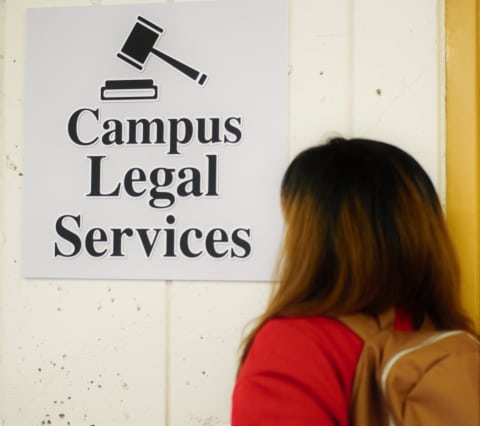Chances are, if you’re faced with a legal issue, you’re not going to know what to do about it. Many post-secondary institutions offer free or reduced-cost legal services for students to make appeals and pursue or defend their rights.
At the University of Saskatchewan, Campus Legal Services exists as a means to aid and provide resources for students in legal disputes. The program has been slow to develop, and limited office hours and resources make it less efficient than third-party-provider counterparts in other post-secondary institutions across the country.
CLS is run by student volunteers and a supervising faculty lawyer. In partnership with the U of S Students’ Union, they offer students free — though conditional — support, information, assistance and representation for academic misconduct and appeals, non-criminal non-academic misconduct, landlord and tenant disputes, small-claims courts, automobile-accident insurance appeals, student-loan issues, and traffic and bylaw infractions.
Additionally, CLS is equipped to assist in Traffic Safety Court matters, non-complex Human Rights complaints, debtor-creditor issues and Automobile Accident Insurance Act appeals.

Campus Legal Services is a mutually advantageous initiative for students and facilitators.
Located in the Arts Tunnel, CLS’s operating hours are sporadic. Through term one, they’ve been open for a few hours on weekday afternoons. Students can go to the centre in person to pursue assistance or send email inquiries on their own time.
However, CLS isn’t the only option that students could have for legal advice.
StudentCare is a third-party company that manages the USSU Health and Dental Plan. StudentCare is employed by about 47 student governance bodies across Canada and represents over 800,000 students. As the largest network of students in the country, it is able to leverage better deals by negotiating on behalf of students as a collective.
In addition to medical and dental coverage, StudentCare offers a Legal Protection plan, which the USSU is currently not a part of. The StudentCare Legal Protection plan offers similar services to CLS but in a more streamlined and efficient manner. Students would be able to access a 24-hour hotline for legal advice and would be represented by one of two professional Canadian law firms, should a case go to court.
Because CLS is funded by the USSU, its services come at no extra cost to U of S students. The StudentCare Legal Protection plan would cost around $28 per student per year, which could either be added to the cost of the existing Health and Dental Plan or to the student fees by term.
So, should the U of S continue to develop its home-grown initiative or might we be better off enrolling in a third-party program that can provide more for students immediately? Abandoning CLS in favour of a third-party plan would mean more resources for students, should they need them, but there are benefits to the volunteer- and student-run option that currently exists.
CLS is an opportunity for professional development for students in the College of Law. CLS volunteers are credited in their — newly implemented — co-curricular records and receive hands-on experience assisting students in academic and legal disputes.
CLS functions similarly to the other USSU Centres, which gives it further protection and support from the students’ union itself. It is also important to note that, because CLS operates directly under the USSU, its policies and practices are closely monitored by the USSU governing body.
The StudentCare Legal Protection plan might be more appealing due to the breadth and accessibility of its services, but CLS is still growing. In time, and with continued effort on the part of the USSU, it could become more of a readily available resource for students. The question remains: is it worth the wait?
—
Emily Migchels / Opinions Editor
Photo: Kate Locsin
Leave a Reply